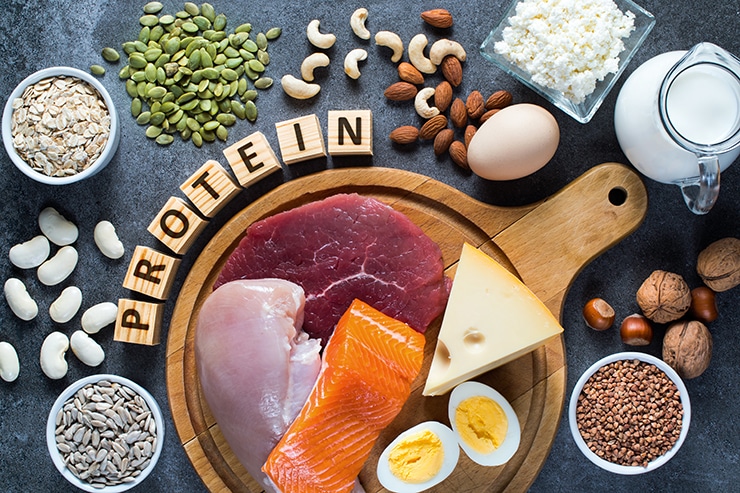
Adrenal dysregulation is due to an imbalance in the HPA Axis (hypothalamus-pituitary-adrenal axis) that is driven by chronic stress. This can be from external stressors, anxiety, trauma, worry, or internal stressors, anything that drives inflammation, malnutrition, leaky gut and dysbiosis. HPA Axis dysregulation drives the dysfunction of the adrenal gland, leading to an underproduction or overproduction of hormones.
The adrenal glands are located on top of the kidneys and produce the hormones cortisol, adrenaline, and aldosterone. These hormones play an essential role in regulating the body’s response to stress, inflammation, blood sugar levels, and blood pressure. Adrenal dysregulation can lead to a variety of symptoms like fatigue, anxiety, depression, weight gain, and insomnia.
Fortunately, there’re foods that’re supportive to your adrenal health and they can improve the symptoms of adrenal dysregulation.
Foods that support adrenal health
Protein: meat, fish, poultry, pork, lamb, eggs, lentils, legumes. Of the three macronutrients, protein performs the best at helping to stabilize blood sugar levels, reducing the need for cortisol to be released in response to low blood sugar. Including high-quality sources of protein such as lean meats, eggs, and legumes in the diet can help to support healthy adrenal function and reduce the risk of adrenal fatigue.
Dark leafy greens: kale, spinach, and collard greens are rich in nutrients that are essential for adrenal health. They contain high levels of magnesium, which is a crucial mineral for the adrenal glands.
Magnesium helps to regulate cortisol levels, and a deficiency in magnesium can lead to increased stress and anxiety. Additionally, dark leafy greens are rich in vitamin C, which can help to reduce inflammation in the body and support the immune system.
Nuts and seeds: almonds, walnuts, and pumpkin seeds are high in healthy fats and protein, making them an excellent snack for those with adrenal dysregulation. They also contain magnesium and vitamin E, which can help to reduce inflammation and support adrenal health.
Whole grains: quinoa, brown rice, and oats are rich in complex carbohydrates, which can help to stabilize blood sugar levels. Adrenal dysregulation can cause fluctuations in blood sugar levels, leading to fatigue and irritability. Eating whole grains can help to regulate blood sugar levels and provide a steady source of energy throughout the day. ½ cup serving, paired with protein and fat is the ideal way to consume whole grains. This will help slow down the absorption of the carbohydrates (sugar), which in turn helps to balance blood sugar.
Fermented foods: kefir, sauerkraut, and kimchi are rich in probiotics, which can help to improve gut health. The gut and adrenal glands are closely connected, and a healthy gut can help to reduce inflammation and support adrenal function. Additionally, fermented foods contain vitamin K2, which is a cofactor for the enzyme that directs calcium into your bones. Learn how to make fermented carrots here.
Berries: blueberries, raspberries, and strawberries are rich in polyphenols, flavonoids and antioxidants, which can help to reduce inflammation in the body. They also contain vitamin C, which can help to support the immune system and reduce the risk of infections. Berries are also low in sugar, making them an excellent snack for those with adrenal dysregulation.
Avocado: a rich source of healthy fats and vitamin E, which can help to reduce inflammation and support adrenal health. It is also low in sugar and high in fiber, making it an excellent snack for those with adrenal dysregulation.
Turmeric: is a spice that’s been used in traditional medicine for centuries. It contains a compound called curcumin, which has anti-inflammatory properties. Curcumin can help to reduce inflammation in the body and support adrenal health. Additionally, turmeric can help to improve digestion and reduce the risk of digestive issues.
The right fats: Macadamia nut oil and coconut oil are sources of medium-chain triglycerides (MCTs), which have been shown to support healthy adrenal function. Additionally, macadamia nut oil is high in monounsaturated fats, which have been associated with improved insulin sensitivity and lower risk of metabolic syndrome, a condition often linked to adrenal dysregulation.
A study published in the journal Clinical Biochemistry found that virgin coconut oil, which contains MCTs similar to those found in macadamia nut oil, improved lipid parameters and reduced LDL oxidation in human subjects, suggesting a potential protective effect against cardiovascular disease, which is commonly associated with adrenal dysfunction.
Adrenal dysregulation can be a debilitating condition that can interfere with many aspects of daily life. Fortunately, there are foods that can help to support adrenal health and improve the symptoms of adrenal dysregulation. Dark leafy greens, nuts and seeds, whole grains, fermented foods, berries, avocado, turmeric and healthy fats are all excellent choices for those with adrenal dysregulation.
Incorporating these foods into the diet can help to reduce inflammation, stabilize blood sugar levels, and support adrenal function. Additionally, it is important to maintain a healthy lifestyle by getting enough sleep, find things that bring you joy, walk and eating at regular times.
Also – caffeine is not a meal. Do not drink this without eating food. Caffeine drives the adrenals and will drive sugar dysregulation in people with adrenal dysregulation.
Order Your Adrenal Fatigue Test Here
- Han, Y. M., Park, J. M., Kang, M. J., Kim, J. H., & Lee, H. J. (2017). The effects of magnesium supplementation on cortisol levels of overweight and obese adults: a systematic review and meta-analysis of randomized controlled trials. Nutrients, 9(11), 1253. doi: 10.3390/nu9111253
- Rangavajla, N., & Sharada, D. (2015). Adrenal fatigue and the role of nutrition: A review of the literature. Journal of Nutrition & Food Sciences, 5(2), 1-5. doi: 10.4172/2155-9600.1000349
- Wilson, J. L. (2016). Adrenal fatigue: A review of the literature. Alternative Therapies in Health and Medicine, 22(6), 44-50.
- Shanahan, F. (2016). The human gut microbiome: A new frontier in understanding health and disease. Inflammation & Allergy Drug Targets, 15(2), 69-76. doi: 10.2174/1871528115666160509121706
- Akbari, M., Ostadmohammadi, V., Lankarani, K. B., Tabrizi, R., Kolahdooz, F., Heydari, S. T., . . . Asemi, Z. (2018). The effects of probiotic supplementation on metabolic status in type 2 diabetic patients with coronary heart disease: A randomized, double-blind, placebo-controlled trial. Diabetes & Metabolic Syndrome: Clinical Research & Reviews, 12(3), 341-347. doi: 10.1016/j.dsx.2017.11.025
- Niki, E. (2016). Antioxidants and atherosclerosis. Biochemical Society Transactions, 44(1), 275-279. doi: 10.1042/BST20150178
- Kelishadi, R., Gouya, M. M., Adeli, K., Ardalan, G., Gheiratmand, R., & Mohammadifard, N. (2008). Association of anthropometric indices with cardiovascular disease risk factors among children and adolescents: CASPIAN Study. International Journal of Cardiology, 117(3), 340-348. doi: 10.1016/j.ijcard.2006.11.071
- Hunter, P. (2018). The hidden health benefits of avocados. Bulletin of the World Health Organization, 96(4), 238-239. doi: 10.2471/BLT.18.030418
- Jurenka, J. S. (2009). Anti-inflammatory properties of curcumin, a major constituent of Curcuma longa: A review of preclinical and clinical research. Alternative Medicine Review, 14(2), 141-153.
- Nevin, K. G., & Rajamohan, T. (2004). Beneficial effects of virgin coconut oil on lipid parameters and in vitro LDL oxidation. Clinical Biochemistry, 37(9), 830-835. doi: 10.1016/j.clinbiochem.2004.04.010
Enjoying this content? Sign up for updates... It's FREE!


